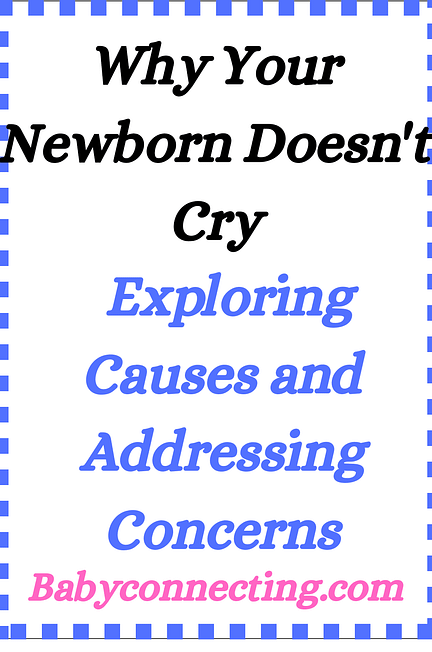“Understanding Why Your Newborn Doesn’t Cry: Exploring Causes and Addressing Concerns”
Introduction:
The sound of a newborn’s cry is often considered a natural and expected part of early parenthood. However, when a newborn doesn’t cry as expected, it can raise concerns and uncertainty for parents. In this article, we’ll delve into the various reasons why newborns may not cry as much as expected, explore potential underlying causes, and provide reassurance and guidance for parents facing this situation. Drawing upon research references, we aim to offer a comprehensive understanding of this topic and alleviate worries for parents.
Exploring Reasons Why Newborns May Not Cry:
While crying is a common means of communication for newborns, it’s important to recognize that individual differences exist, and not all babies cry with the same frequency or intensity. Several factors may contribute to a newborn’s reduced crying:
1. Temperament:
Just like adults, newborns have their own unique temperaments, with some being naturally more relaxed and content than others. A calm temperament may result in less frequent crying episodes.
2. Physical Well-being:
Newborns who are well-fed, comfortable, and in good health may cry less frequently than those experiencing discomfort or illness. A satisfied baby may have fewer reasons to cry.
3. Sleep Patterns:
Newborns spend a significant portion of their early days sleeping, and some babies may be more inclined to sleep soundly without fussing or crying excessively.
4. Quiet Alert State:
During periods of quiet alertness, newborns may be awake and attentive but not necessarily crying. They may be observing their surroundings or showing signs of contentment without the need to cry.
5. Parental Responsiveness:
Prompt and attentive caregiving, such as meeting a baby’s needs before they escalate to crying, can result in a baby feeling secure and less inclined to cry for attention.
Should You Be Worried?
While a newborn’s reduced crying may be entirely normal and reflective of their temperament or well-being, there are instances where further evaluation may be warranted:
1. Lack of Responsiveness:
If a newborn shows signs of distress or discomfort but does not cry or respond to attempts at soothing, it may indicate an underlying issue that requires attention.
2. Feeding and Weight Gain:
Newborns who do not cry or show hunger cues during feeding sessions may be at risk of inadequate caloric intake, which can impact weight gain and overall health.
3. Changes in Behavior:
Any sudden changes in a newborn’s behavior, such as decreased activity, lethargy, or excessive sleepiness, should prompt further evaluation by a healthcare provider.
4. Medical Conditions:
Certain medical conditions, such as hearing loss or neurological disorders, may affect a newborn’s ability to cry or communicate effectively.
Research References:
1. American Academy of Pediatrics. (2016). Newborn Behavior and Cues. HealthyChildren.org.
2. Hunziker, U. A., & Barr, R. G. (1986). Increased Carrying Reduces Infant Crying: A Randomized Controlled Trial. Pediatrics, 77(5), 641-648.
3. Lester, B. M., Boukydis, C. F., & Garcia-Coll, C. T. (1995). Developmental Outcome as a Function of the goodness of fit Between the Infant’s Cry Characteristics and the Mother’s Perception of her Infant’s Cry. Pediatrics, 95(4), 516-521.
Conclusion:
While a newborn’s crying is a typical aspect of early infancy, it’s important for parents to recognize that variations in crying frequency and intensity are normal. Factors such as temperament, physical well-being, sleep patterns, and parental responsiveness can influence a newborn’s crying behavior. However, if you have concerns about your newborn’s lack of crying or notice any changes in their behavior or health, it’s essential to seek guidance from a healthcare provider. By staying informed and attentive to your baby’s needs, you can navigate the early days of parenthood with confidence and peace of mind.



